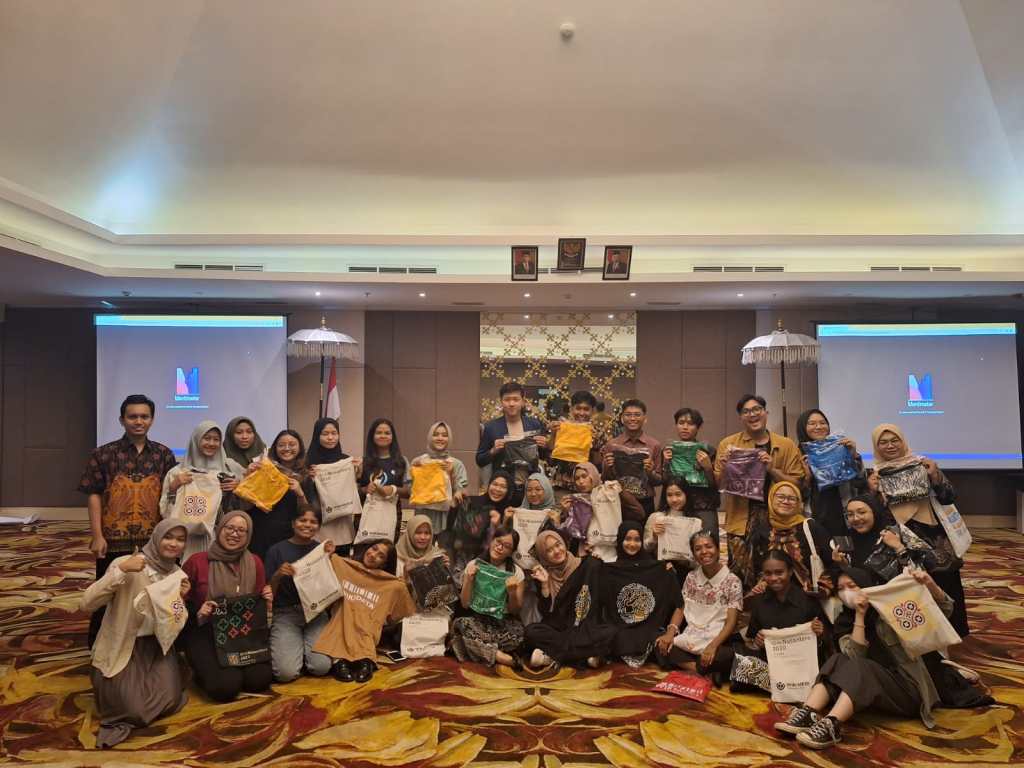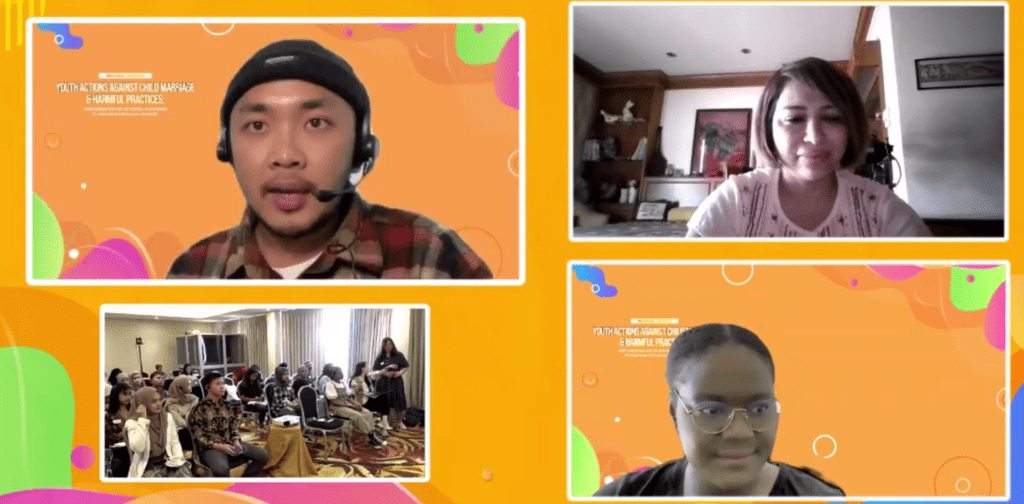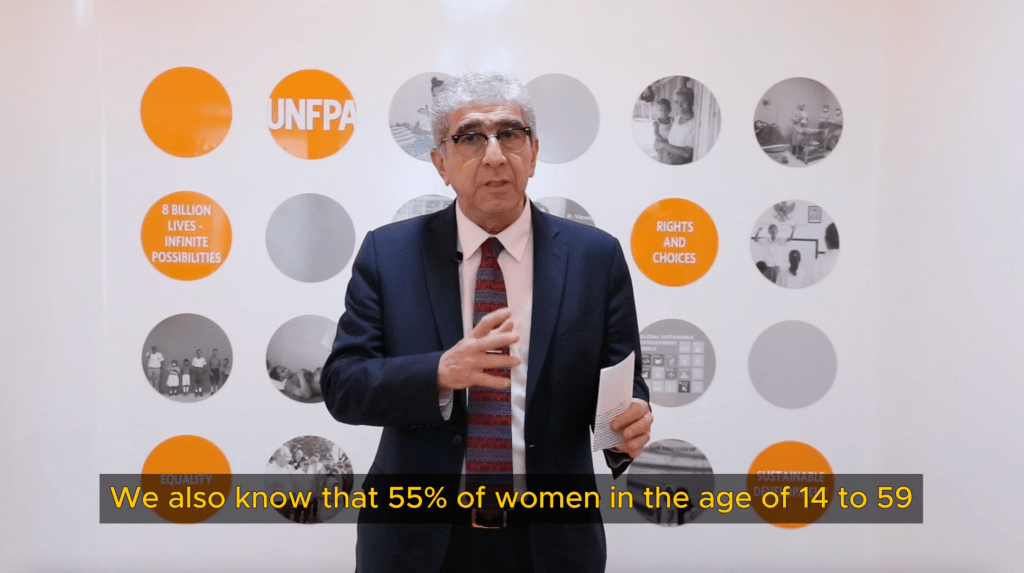
From November 18th to 19th, 2023 Wikimedia Indonesia and the Wikimedia Foundation took part in the regional and national level dialogue on “Youth Actions Against Child Marriage and Harmful Practices” hosted by the United Nations Population Fund (UNFPA), the UN sexual and reproductive health agency. The event aims to raise awareness among Indonesian youths about sexual and reproductive health and its crucial role in preventing harmful practices such as child marriage and Female Genital Mutilation/Cutting (FGM/C). Additionally, it seeks to establish a national platform for knowledge exchange and peer-to-peer learning, while also providing capacity building for Indonesian youths to take action, utilizing digital platforms for effective campaigning on these issues.
On the first day of the conference, Masana Mulaudzi, Senior Manager of Campaigns Organizing at the Wikimedia Foundation, discusses the Wikimedia Movement’s commitment to closing the gender gap in the digital space to nearly 100 people who joined the event in person and virtually. Masana touches on the replication of global gender inequality patterns in the Wikimedia ecosystem as well as the challenges and needs faced by content creators, editors, functionaries, and organizers within the movement. The talk also delves into the systemic issues faced by women, non-binary individuals, and marginalized communities, outlining the strategies and efforts employed to bridge these gaps. Masana’s presentation concludes by highlighting the collective efforts of the Wikimedia community and encouraging ongoing collaboration to promote gender equality and knowledge equity in the digital realm.
“Young people in Indonesia and across the world need safe access to accurate, accessible content on trusted sexual and reproductive health on the internet. To create this information, we rely on the efforts of a diverse group of contributors, including editors. The Wikimedia Movement demonstrates the powerful impact of collective efforts at closing the gender gap – in roughly 10 years, editors who identify as women have increased from under 10% to 22% in 2023 – representing a roughly 100% increase. While organizers who invite new editors into our movement need more support to sustain this growth, partnerships like this one with the UNFPA, can help our movement develop content that responds to the needs of our time.”
Masana Mulaudzi

Hassan Mohtashami, UNFPA Indonesia Representative, emphasized the centrality of sexual and reproductive health and rights to the gender equality and human rights agenda. He stated, “Without sexual and reproductive health and rights, we will not achieve full gender equality and human rights, hindering our progress in development, peace, and security.”

In Indonesia, where one in nine children are married before the age of 18, and 55% of women aged 14 to 59 report their daughters undergoing female genital mutilation/cutting (FGM/C), the need for action is urgent. Hassan highlighted the pivotal role of digital platforms, with approximately 150 million people accessing digital media at any given time. He stressed the importance of crafting messages that resonate with audiences through these platforms, delivering comprehensive and accurate information to combat child marriage and FGM/C.
On the second day of the conference, Rachmat Wahidi (Wikimedia Indonesia Chair), had the opportunity to interact with 30 Indonesian youths from UNFPA’s youth networks, namely the Community of Practice for SRH Youth Content Creators, BESTARI scholarship recipients (scholarship targeted to Indonesian girls to prevent child marriage), and Female Genital Mutilation/Cutting (FGM/C) National Youth Facilitator network through his in-person workshop.
“In this digital era, social media gently ushers in various transformations in people’s lives. Its utility shines as a valuable tool for advocating positive changes in societal norms, changes that may still be unfamiliar to many. Nurturing media and information literacy becomes vital for individuals to eloquently express their thoughts and access accurate information. We warmly extend an invitation to you to join the Wikimedia movement to collaborate harmoniously in creating and enhancing articles centered around women’s topics, for a more informed and inclusive digital world.”
Rachmat Wahidi, to the youths who present at his session
Rachmat shared his insights on utilizing media and information literacy for the digital movement. In his workshop, Rachmat mentions the importance of media and information literacy to filter information, combat misinformation and disinformation, as well as to protect personal information on the internet. He also correlates those aspects with the role of Wikipedia in media and information literacy by introducing Bahasa Indonesia Wikipedia as an example, highlighting the importance of the “talk” page to discuss the accuracy of recent edits on Wikipedia as well as “revision history”. At the end of his presentation, Rachmat highlights the effort of Wikimedia Indonesia to bridge the gender gap by participating in the planned Wiki Women’s Health campaign while sharing the example of the women’s health Wikipedia articles that required improvement as a call to action.
The event has opened up the understanding of how the Wikimedia movement could align with the global effort to bridge the gender gap, particularly on women’s health topics spearheaded by UNFPA. This collaboration shall serve as a milestone for further partnerships with UNFPA in the Asia Pacific region.

Can you help us translate this article?
In order for this article to reach as many people as possible we would like your help. Can you translate this article to get the message out?
Start translation